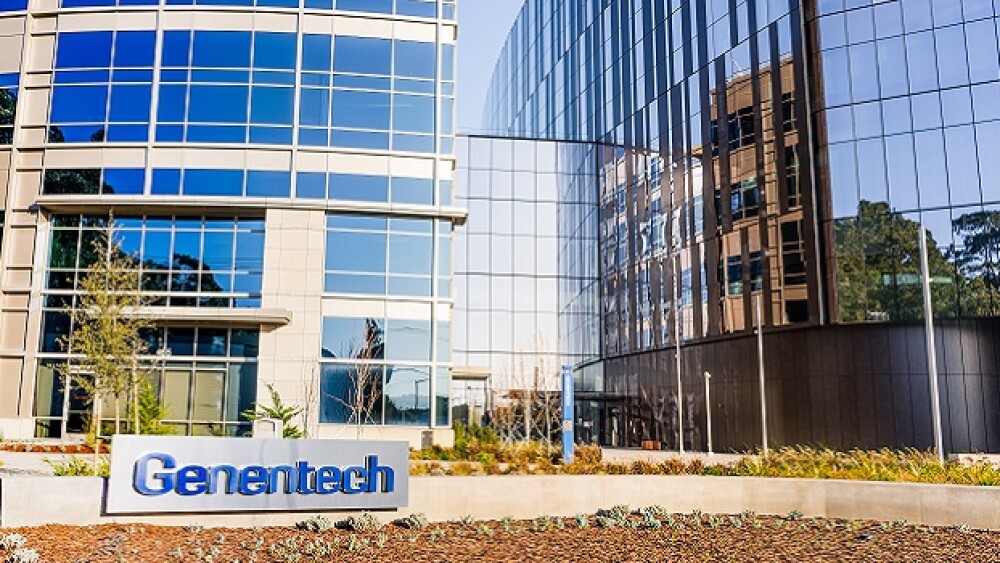Polivy is approved for front-line DLBCL as part of a combination regimen including Rituxan, cyclophosphamide, doxorubicin and prednisone.
Pictured: Genentech sign in front of building/Sundry Photography/Adobe Stock
The FDA has approved Roche-subsidiary Genentech’s Polivy (polatuzumab vedotin-piiq), as part of a five-drug regimen, for the first-line treatment of patients with diffuse large B-cell lymphoma (DLBCL), the company announced Thursday.
The treatment regimen combines Polivy with Rituxan (rituximab), cyclophosphamide, doxorubicin and prednisone (R-CHP). The approval additionally covers patients with high-grade B-cell lymphoma with an International Prognostic Index score of at least two.
Thursday’s regulatory win marks the first time in nearly 20 years that a new therapeutic option was approved for patients with newly diagnosed DLBCL, Levi Garraway, chief medical officer and head of global product development at Roche, said in a statement.
The FDA’s decision also converts Polivy’s accelerated approval, granted in June 2019, as a combination regimen with Rituxan and bendamustine in relapsed or refractory DLBCL to regular approval.
With the current standard of care, nearly half of patients relapse after initial treatment, Charles Fuchs, senior vice president and global head, Oncology & Hematology Product Development, Genentech and Roche, told BioSpace in an email. “Our goal is to prevent that by offering an effective and tolerable therapy at the time patients are first diagnosed and have received no prior treatment, ultimately delaying disease progression and the need for subsequent treatments.”
Genentech is also studying Polivy in other types of blood cancers and in combination with other therapies, Fuchs told BioSpace.
Polivy is an antibody-drug conjugate targeting the CD79b protein, commonly expressed on the surface of B cells. Its FDA bid was supported with Phase III randomized and double-blinded POLARIX study data.
Results showed that the Polivy-based regimen reduced the risk of disease progression, relapse or death by a significant 27% compared to the standard-of-care regimen R-CHP plus vincristine. POLARIX enrolled 879 patients.
As for safety, grade 3/4 and grade 5 adverse events, serious side effects and toxicities leading to dose reductions were comparable between the Polivy-based combination regimen and standard of care.
FDA Questions Benefit-Risk
In March, this efficacy and safety profile earned the support of the FDA’s independent Oncologic Drugs Advisory Committee, which voted 11–2 in favor of Genentech, finding that Polivy had a favorable risk-benefit profile for first-line intervention in this patient population.
However, a briefing document released before the Committee meeting showed the FDA’s concerns regarding Polivy’s efficacy.
While POLARIX showed a statistically significant improvement in its primary endpoint of progression-free survival, FDA staffers found Polivy’s 27% treatment effect to be “modest.” They questioned whether it could be considered clinically meaningful.
The FDA also flagged Polivy’s lack of benefit in overall survival (OS) and complete response and modest effect on disease-free survival, event-free survival and duration of response.
In particular, the Polivy regimen led to a non-significant 6% drop in the risk of death compared to standard treatment after a median follow-up of 39.7 months. Moreover, in some earlier time points during POLARIX, OS data favored the standard of care.
“While there is uncertainty associated with the point estimates due to low event rates, lack of improvement in OS, particularly in the context of frontline therapy for LBCL, is a reflection of safety and efficacy and adds to the uncertainties in benefit-risk,” the FDA wrote in the briefing document.
Tristan Manalac is an independent science writer based in metro Manila, Philippines. He can be reached at tristan@tristanmanalac.com or tristan.manalac@biospace.com
Update (April 20): This article has been updated to include comments from Roche.






